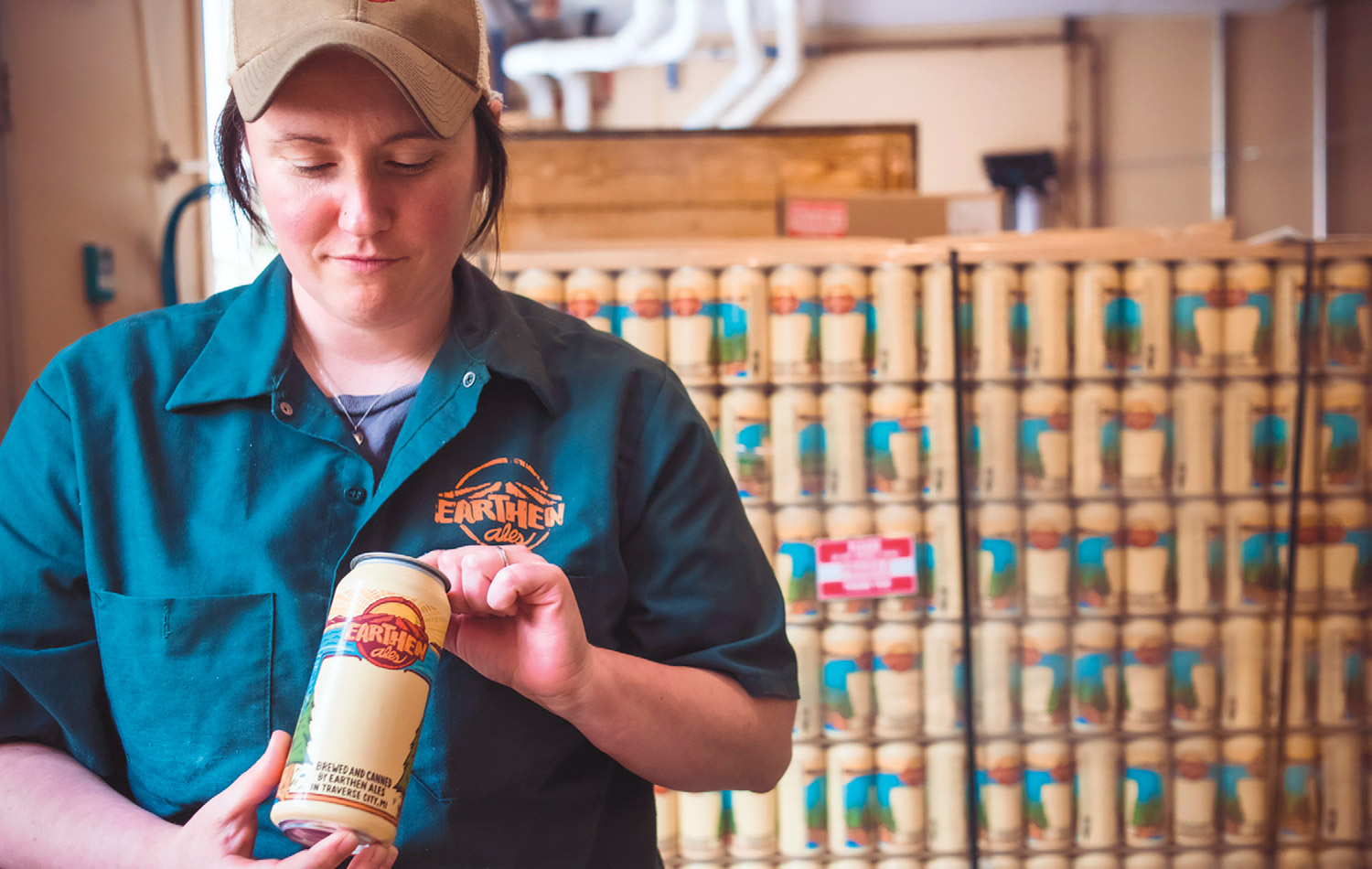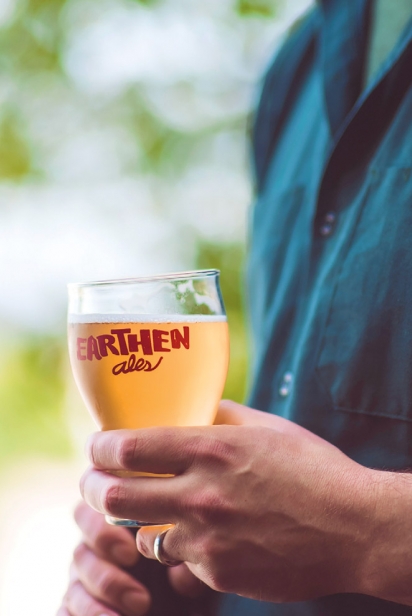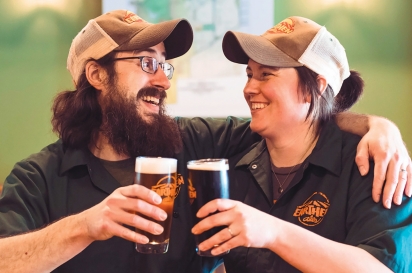Earthen Ales
For some regular patrons of The Village at Grand Traverse Commons, it was only two-and-a- half years ago that the monumental project at last became a complete community. That was when a brewery named Earthen Ales opened for business in a renovated Building 60. Up until then, The Village had fine dining, fine coffee, fine wine and fine art, but it was missing the casual environs of a local brewery. Leave it to two urban planners with a love for both beer and place to finally make it happen.
Also fitting is that you can find Earthen Ales located in the shadow of the old water tower. What’s more symbolic of good planning than a water tower? The founders, Jamie and Andrew Kidwell-Brix, brought the brewery into being through solid planning, investments and donations from friends, family and strangers alike, plus lots of love.
The couple met while working in the planning department for the City of Ann Arbor. They discovered they shared an affection for home brewing. Jamie’s grand gesture to Andrew was a growler of Short’s beer at a time when growlers were still uncommon. They then began trading their own home-brewed beers, which led to them brewing together, and eventually led to the opening of Earthen Ales.
“We started making beer together and realized that we didn’t want to spend our careers working for local government,” says Andrew. He was the first to leave the desk job and trade it in for something more earthy: helping a friend grow vegetables in Leelanau County. Jamie would visit on the weekends and, over time, the big move north began to make more and more sense.
“We fell in love with it up here,” says Jamie.
Upon realizing where they wanted to live the next step was to figure out what to do with all the beer they were brewing. “We had been brewing beer at home for over a decade and together for over nine years,” says Jamie. “When we were talking about doing this for real, Andrew and I took journals to the bar, had a couple of pints, wrote down all the things that we’d want if we did this, and then we compared our notes.”
Something they both agreed upon was that their roots in planning would inform both the space and the delivered product. “Because we have backgrounds in planning and thinking about place, we do think about beer as having a sense of place. Normally wine gets more fanfare around that, but our Juniper Rye is an Up North IPA,” says Andrew. “The juniper berries and that kind of piney-ness of that beer is intended to remind us of where we live.” With this beer, they both can sense the shift in landscape in the middle of the state—that unmistakable transition when “downstate” gives way to “Up North.”
Their summer seasonal Lime Wit is also inspired by place—but in this case, a recollection of Jamie’s home of coastal Texas. The summery Wit (white) beer evokes warm climates, beaches and plenty of limes in your drink. This Belgian-style wheat beer is brewed using120 limes, zested by hand, for every 50-gallon batch.
The pair of them share the brewing responsibilities and after years of brewing together they have a natural give-and-take with each other’s pursuits. “Either one of us can have a ‘Hey, I want to do this or that’ inspiration and then the other one ends up as a moderating force to keep things from getting too wild and chaotic,” says Andrew. But then he adds, “And sometimes she just cuts me loose and lets me do something stupid.”
“I’m a little bit more of a curmudgeon when it comes to historical styles and water treatment,” says Jamie, accepting her role as a traditionalist. “I’d say we like to do slight twists on classic styles.”
The Juniper Rye is an example. It is a centuries- old Finnish sahti that they have turned into an American IPA. According to the American Homebrewers Association, a type of sahti dates back at least to the Vikings of ninth century. Sahtis were made with a variety of ingredients available near the villages and farms where they were brewed. Today, sahtis fall into the farmhouse- style ale category. They have a distinct pine flavor because of the use of juniper berries and sometimes the branches and twigs as well.
Jamie and Andrew say they often get asked what they talk about when they go home after working together all day in the brewery. After nine years of brewing together, five years of marriage and two-and- a-half years owning the brewery, they admit it still revolves around beer.
“At the end of the day, we generally go home, open a beer and talk about beer,” says Jamie. Adding, “I feel like very early on in our relationship that is what we did.
We brewed every weekend and talked about beer. It’s a really great collaborative space for us to share and we haven’t gotten tired of doing it.”
After a cautious first couple of years, they are planning to pursue some new opportunities in their third year. “We’re saying ‘yes’ to filling cans to sell in the taproom and we’re looking to say ‘yes’ to selling more of our beer outside of the taproom,” says Andrew. Also in the works is a monthly “Community-Supported Ales” plan—a CSA-style monthly subscription for a pickup of mixed small batches. So make your own plans to stop by, say “yes” to a seasonal draft pint and see how their plans are coming, near the foot of the water tower of Grand Traverse Commons, at Earthen Ales.
Earthen Ales
1371 Gray Dr., Suite 200
Village at Grand Traverse Commons
Open Monday–Saturday until 10 PM, Sunday to 9 PM
EarthenAles.com







